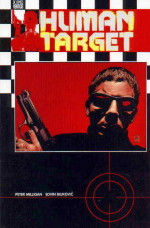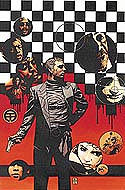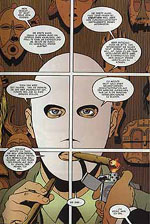>> Comment: Appointments With Disappointment
>> Comment: Accentuate The Positive?
More...

 Writer: Peter Milligan
Writer: Peter Milligan
Artist: Edvin Biukovic
Colourist: Lee Loughridge
Letterer: Robert Solanovic
Collecting HUMAN TARGET #1-4
Price: $12.95
Publisher: Vertigo/DC Comics
ISBN: 1-56389-683-1
When the various narrative media came together in some unholy union and gave birth to sequential art, they each left a little something with it. A genetic gift of only its best facets. From time to time this lead to an identity crisis for the genre. The need to follow in its parents' footsteps held in direct opposition to the need to seek out new ground. It took the brightest stars of the medium to understand that to favour one does not exclude the other. To mimic film or literature or fine art does not mean that the more esoteric and individual advances of sequential art cannot be incorporated. The idea that the child will one day outgrow the parent does not necessarily mean it has to forgo its parents knowledge base.
It's hard enough to find good action movies in the multiplex, so it came as a great surprise to find one on the spinner rack. HUMAN TARGET collects the four-issue mini-series by Peter Milligan and the sadly-missed Edvin Biukovic. If Peter Milligan has ever been consistently anything, it's different. Which is where HUMAN TARGET surprises. While it retains the spirit of quirkiness, it is overtly a 96-page action movie presented in the sequential format. Its surprisingly mainstream core is not a usurpation of the genre's unique aspects. Rather, they are the meat on a more easily recognisable skeleton.
Christopher Chance is the Human Target. A man who takes the heat for others, who becomes people for money. Chance uses his physical and psychological training to completely become somebody else. However, he is growing old, and now only takes on cases per his whims. When he turns down a facially scarred masked man who is being hunted by a trained assassin named Emerald, he believes he'll hear no more about it. When Emerald attempts to kill Chance, he is yet again confronted by the masked man, and is forced to question his own identity.
A trade paperback collection may be the more resilient and easier way to market this story, but it loses one important element of the serialisation approach. The first issue ends on one of the most disturbing cliffhangers I've ever read. Only upon reading the second issue does the full situation become apparent. It's questions of identity that Peter Milligan is playing with here, and every character pulls at this concept in different directions. The major twist that occurs a quarter of the way in is enough to unsettle you for the rest of the story.

While HUMAN TARGET never quite eclipses its opening church shoot-out, ending with the extremely over-the-top missile-launcher attack, it is peppered with ingenious set-pieces. The scene in which Emerald confronts Christopher Chance while he's getting a facial mask is effortlessly well paced. Both Chance and Emerald are vicious and unremitting in their attempt to outdo each other. Neither plays by the rules. It's the freewheeling element to the equation that provides this collection's interesting spark and climax.
Setting its camp in the first page as the deadly killer Emerald swings past the classic LA vista of the Hollywood sign, Peter Milligan borrows from only the best of the action genre. His writing feels more streamlined here, more mainstream, and a great deal more hard-boiled. There is none of the overly purple prose and surrealism of Milligan's past projects, and he pulls off his transformation into action-movie impresario with ease. At times the constant flickering of identity can be confusing, but it's more than likely an intentional approach. Even the ending is ambiguous.
The series is an update of an old DC character in the grand tradition of the Vertigo line. Christopher Chance was created by Len Wein and Carmine Infantino in the seventies, popping up as a backup in DETECTIVE COMICS from time to time. Vertigo has neatly steered clear of revamping the more recognisable DC Universe characters, allowing the creators far more leeway with their reinvention. While they find hidden gems to show the world inside the fictional world of the comic, they have also done the same for one of the series' creators.
 Edvin Biukovic was part of a small movement of East European artists who have made the breakthrough into comics. Alongside Goran Sudzuka, Edvin found a home in the refined mature style of the Vertigo line. He died shortly after this series finished publication, and it is tragic that such a talent has been wasted. Utilising a fine, clear line and retaining a pleasing consistency to its scenes, HUMAN TARGET is easy to read. Edvin Biukovic's art retains a European edge, but also comes close to perfecting the stylised reality of modern celluloid. Riding close to the photo-realism, it still manages to incorporate such modernities as speed-lines without losing integrity. Edvin's work here is compelling and demonstrates a perfectionist outlook that would not let him demean his ability in the ongoing rush of scheduling and deadlines.
Edvin Biukovic was part of a small movement of East European artists who have made the breakthrough into comics. Alongside Goran Sudzuka, Edvin found a home in the refined mature style of the Vertigo line. He died shortly after this series finished publication, and it is tragic that such a talent has been wasted. Utilising a fine, clear line and retaining a pleasing consistency to its scenes, HUMAN TARGET is easy to read. Edvin Biukovic's art retains a European edge, but also comes close to perfecting the stylised reality of modern celluloid. Riding close to the photo-realism, it still manages to incorporate such modernities as speed-lines without losing integrity. Edvin's work here is compelling and demonstrates a perfectionist outlook that would not let him demean his ability in the ongoing rush of scheduling and deadlines.
The muted, but suitably selected colour schemes of Lee Loughridge demonstrate one of the Vertigo line's best colourists at work. Lee's work is reminiscent of Matt Hollingsworth at his best. There is no overt use of fancy PhotoShop trickery, no lens flares or motion blurs, but the work still feels like a movie reel. Or at least, the stylised false paper reality of a movie. The lettering is never cluttered and is always easy to read. It has a little more body than most normal lettering, and copes admirably with differing caption boxes.
While Biukovic excels during the over-the-top action set-pieces, it's during the identity-questioning twists that Milligan shines. In the tradition of the best intelligent action-movies, HUMAN TARGET maintains its pace but never lets the action get in the way of the narrative. Wrapped in career-best Tim Bradstreet covers before he became the go-to man he is now, HUMAN TARGET is a rare enough commodity in comics. As the modern motion picture mainstream drains dry of true quality, its offspring is excelling and more.

This article is Ideological Freeware. The author grants permission for its reproduction and redistribution by private individuals on condition that the author and source of the article are clearly shown, no charge is made, and the whole article is reproduced intact, including this notice.


